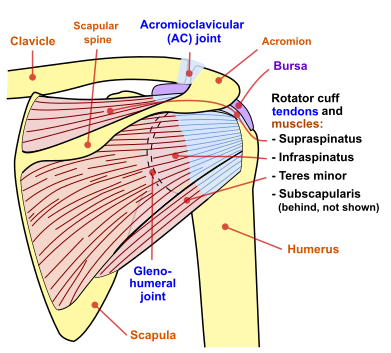The title of this article make you focus on the shoulder. Initially, I would like you to focus on the word syndrome. Every time we see the word syndrome, it is important to be aware that more factors are at play.
 The main focus in medical literature, when it comes to “Frozen Shoulder Syndrome”, is a contraction of the fibrous capsule surrounding the shoulder joint and it is described as something that takes a long time to get over.
The main focus in medical literature, when it comes to “Frozen Shoulder Syndrome”, is a contraction of the fibrous capsule surrounding the shoulder joint and it is described as something that takes a long time to get over.
The movement of the shoulder is very complex; the shoulder joint has a big range of motion and a very small joint surface on the proximal side. Furthermore, a good quality of movement of the arm relies on a good cervical posture and a good scapula humeral rhythm. The scapula-humeral rhythm is how the scapula and the humerus dance together when we move the arm. A good cervical posture creates a good foundation for movement and it brings space for nerves and blood vessels to function unrestrictedly.
When we have a client, in META-Health it is important to listen to the client’s symptoms to be clear about what movements are difficult and address those.
There are 3 emotional areas/tissues and issues I would like to point out
- The cervical spine C3-C7:
The feeling of unfairness; that you have to bend your head to be good enough. You aren’t good enough when you stick your head up. - The Supraspinatus muscle:
This is about moving someone a little bit away from you. It is not about getting people out of your way. It is the feeling that you need room to breathe and the doubt whether you deserve it. - Movement of the shoulder joint:
If you have got a full blown frozen shoulder it is difficult to move your arm in any direction. Therefore, I would look at the feeling that you feel restricted in any direction. There are things or persons that you can’t get out of your system, you don’t know how to and you don’t know what to do, if you actually succeed in getting them out of your system. So, a dilemma about letting them go and holding on to them.

When working with the musculoskeletal system, it is important to remember to address Kidney 1 (KCT)
A secondary aspect about the frozen shoulder is, what have you read about it? If you google “Frozen Shoulder Syndrome” it can be quite depressing, so know that there are some things you can do.
As a physical therapist, a lot of the patients I have had didn’t have a real frozen shoulder, so be critical and if you look at the 3 themes pointed out you should be able to make a shift in a short time 🙂
Study biological programming and how it can relate to mental and physical dis-ease to help the World be META-healthy!
pictures: https://commons.wikimedia.org/wiki/File:Shoulder_joint_back-en.svg
MHI

 META-Healthy Life articles are created by professionals and friends of META-Health International CIC, supporting individual and global health by deepening and sharing our understanding of how resilience and well-being are achieved.
META-Healthy Life articles are created by professionals and friends of META-Health International CIC, supporting individual and global health by deepening and sharing our understanding of how resilience and well-being are achieved.